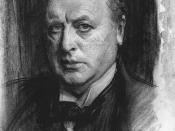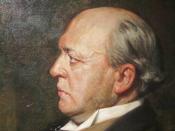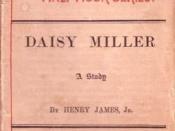--Fluctuations--
Daisy Miller, Henry James
Chapter 3, pg.88-90
÷ Note: I will not make a clearly identifiable distinction between the narrator, Winterbourne or myself, as I believe this haziness to be a fundamental mode of transmission of the message the author wants to portray. The short story 'Daisy Miller' is quite ironically not about Daisy at all. Rather it is a novel about Winterbourne and more broadly about society as a whole. In fact, to extend this prominent message even further, it is a novel about interpretations and impressions. Hence I have merged my own identity with the narrator's, imposing yet another point of view to the already prejudicially impinged narrator comments.
After yet another flirtatiously intimidating comment Daisy, having noticed Giovanelli leaning against a tree, draws the 'brilliant' Italian's presence to Winterbourne's attention. She even notes admirably on his serene and secure air as he gazes upon the ladies beneath, progressing in the common carriages of Rome.
Winterbourne, in submission to the charming American girl's desire, browses the area for the infamous Giovanelli of whom his companion expresses nothing but zealous admiration. Winterbourne distinguishes in the distance a man of petite stature. The man is standing with folded arms and is fully occupied with his cane. The narrator, most likely in expression of Winterbourne's judgments, describes the 'brilliant' Italian as a man of attractive countenance and elegant style. The narrator portrays Giovanelli's attire as that of a shrewdly dressed man, with a spectacle in one eye, a hat gracefully suspended at an angle, and overly conspicuous buttonholes.
Winterbourne however seems to be resentful of the Italian. Henry James, often uses the eye-striking buttonhole mentioned previously as a sign of a man's improperness Thus the fact that Winterbourne observes the buttonholes and that the narrator comments on...


